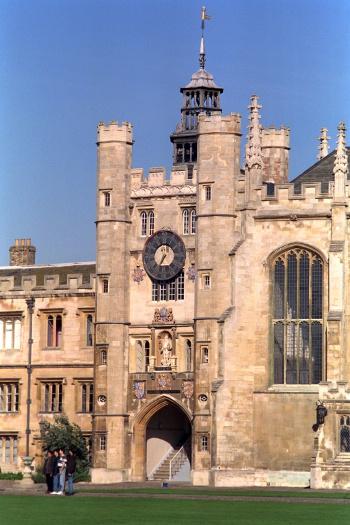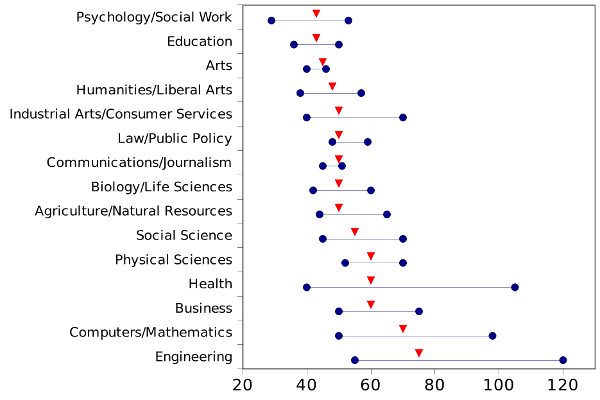
College Cost/Benefit Analysis
June 3, 2011 Higher education has gotten a lot of criticism lately, just as it's beginning to see competition from online learning ventures. The cost of a college education is far too high, largely because universities have been transformed into businesses with bloated bureaucracies. This is especially evident in STEM fields (possibly minus the "M"), where professors who pull in government and private foundation money pay the hefty salaries of administrators who wouldn't know how to spell any of the key words. Every year, there's a new crop of graduates who enter the world with $50,000 - $100,000 in debt. Some of these, not finding the career that college supposedly trained them for, often compete for menial service jobs against individuals who never went to college and don't have the debt. Peter Thiel, a co-founder of Paypal, has a foundation that intends to give $100,000 Thiel Fellowships to each of twenty-four people under the age of twenty to have them drop out of college and start their own companies.[1] The intended topic areas for these ventures include robotics, mobility, energy, biotechnology, information technology and space. Thiel, who has strong opinions on many matters, thinks that a college education is irrelevant for some people. Not surprisingly, there are dissenters. | Clock tower of Trinity College, Cambridge University. Photo by Bob Tubbs (1995). (Via Wikimedia Commons) |
"The academic job market collapsed in the 1970s, yet universities have not adjusted their admissions policies, because they need graduate students to work in laboratories and as teaching assistants. But once those students finish their education, there are no academic jobs for them."[2]Taylor is author of the book, "Crisis on Campus: A Bold Plan for Reforming Our Colleges and Universities."[3] Another article in that same issue of Nature mentions Stephen Spoonamore, the chief executive and co-founder of ABSMaterials (Wooster, Ohio), who espouses a variant of Peter Thiel's philosophy. Spoonamore believes that an undergraduate education is useful, but a Ph.D. is nearly irrelevant, since it involves the wrong sort of training. Spoonamore, who doesn't have an undergraduate degree, founded his first company at age 18, and he's founded thirteen technology companies in all. He says that he pays Ph.D.s about the same as undergraduates, and promotes both corps with equal facility.[4] The Chronicle of Higher Education has just published on its web site a study that is claimed to be the first analysis of earnings as a function of college major.[5-7] This study,[6] "What's It Worth? The Economic Value of College Majors," by Anthony P. Carnevale, Jeff Strohl and Michelle Melton of the Georgetown University's Center on Education and the Workforce examined US census data for individuals with 171 different college majors. It comes as no surprise, of course, that certain specialties, such as engineering, pay a lot more money than others, as can be seen in the figure.
 Median annual income ($k, red triangles) and the range of median annual income for subspecialties for various professions at the bachelor's degree level. Data from the Georgetown report,[7] with plotting by Gnumeric
The Georgetown report examined full-time workers between the ages 25 and 64 who work fulltime. Although it did analyze statistics for college degrees at bachelor's level and beyond, it did not include associate's degrees since the data is too sparse for meaningful conclusions. Overall, a high school diploma results in a median income of about $32,000, jumping to $55,000 for a bachelor's degree. This $23,000 difference indicates that a four-year degree really does pay off; provided, however, that you have a job.
Some of the Georgetown data are especially interesting. The median annual income for counseling-psychology majors was just $29,000, which falls below the median annual income for all high school graduates. A petroleum engineer with a bachelor's degree makes $120,000, which is often more than a Ph.D. in some professions. A bachelor's degree gives a 74% premium over a high school diploma, and an advanced degree gives an 84% premium. So, a Ph.D., on average, won't make double the money of a high schooler, which seems to be somewhat of a disappointment.
As expected, men make more than women in every field, with some spectacular examples. Male math majors scored about $75,000, and female math majors just $54,000. The Georgetown explanation is that women mathematicians are more likely to be teachers.
Women have the upper hand in visual/performing arts, physiology, and information science. Since this research considered just fulltime workers, it's evident that the income gap between genders can't be explained by more women than men working just part time.
I, for one, welcome our new petroleum engineer overlords.
Median annual income ($k, red triangles) and the range of median annual income for subspecialties for various professions at the bachelor's degree level. Data from the Georgetown report,[7] with plotting by Gnumeric
The Georgetown report examined full-time workers between the ages 25 and 64 who work fulltime. Although it did analyze statistics for college degrees at bachelor's level and beyond, it did not include associate's degrees since the data is too sparse for meaningful conclusions. Overall, a high school diploma results in a median income of about $32,000, jumping to $55,000 for a bachelor's degree. This $23,000 difference indicates that a four-year degree really does pay off; provided, however, that you have a job.
Some of the Georgetown data are especially interesting. The median annual income for counseling-psychology majors was just $29,000, which falls below the median annual income for all high school graduates. A petroleum engineer with a bachelor's degree makes $120,000, which is often more than a Ph.D. in some professions. A bachelor's degree gives a 74% premium over a high school diploma, and an advanced degree gives an 84% premium. So, a Ph.D., on average, won't make double the money of a high schooler, which seems to be somewhat of a disappointment.
As expected, men make more than women in every field, with some spectacular examples. Male math majors scored about $75,000, and female math majors just $54,000. The Georgetown explanation is that women mathematicians are more likely to be teachers.
Women have the upper hand in visual/performing arts, physiology, and information science. Since this research considered just fulltime workers, it's evident that the income gap between genders can't be explained by more women than men working just part time.
I, for one, welcome our new petroleum engineer overlords.
References:
- Eyder Peralta, "PayPal Co-Founder Hands Out $100,000 Fellowships To Not Go To College," NPR, May 25, 2011.
- Mark Taylor, "Reform the PhD system or close it down," Nature, vol. 472, no. 7343 (April 21, 2011), p. 261.
- Mark Taylor, "Crisis on Campus: A Bold Plan for Reforming Our Colleges and Universities," Knopf, August 31, 2010, 256 pages (Via Amazon).
- Alison McCook, "Education: Rethinking PhDs," Nature, vol. 472, no. 7343 (April 21, 2011), p. 280-282.
- Beckie Supiano, "What Are You Going to Do With That?" Chronicle of Higher Education, May 24, 2011
- Anthony P. Carnevale, Jeff Strohl and Michelle Melton, "What's It Worth? The Economic Value of College Majors," Georgetown University's Center on Education and the Workforce, May 23, 2011 (Full report, 11 MB PDF file.
- Median Earnings by Major and Subject Area, from "What's It Worth? The Economic Value of College Majors," by Anthony P. Carnevale, Jeff Strohl and Michelle Melton of the Georgetown University's Center on Education and the Workforce, May 23, 2011.
- Mark Taylor, "Reform the PhD system or close it down," Nature, vol. 472, no. 7343 (April 21, 2011), p. 261.